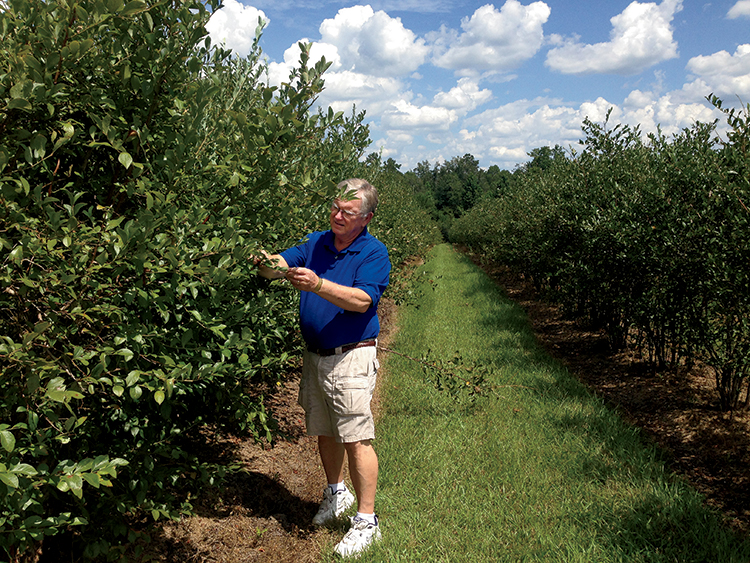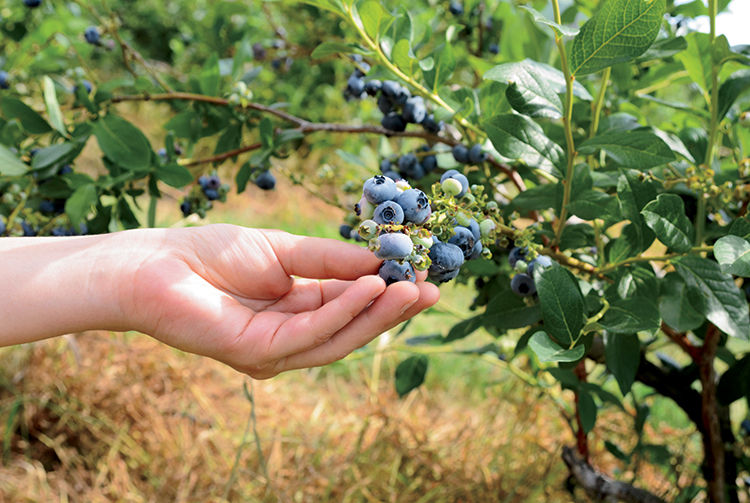Home > Mississippi > Mississippi Farm to Table > Blueberry Co-op Keeps Consumers Safe and Sound
Blueberry Co-op Keeps Consumers Safe and Sound
In partnership with: Mississippi Department of Agriculture and Commerce
 Whether you’re buying frozen blueberries for a breakfast smoothie or grabbing a clamshell of fresh berries from the produce aisle, the members of Miss-Lou Blueberry Growers Cooperative in Lumberton have a total, unconditional commitment to keeping consumers safe. “Every farm that is part of the co-op is inspected annually and has to show their commitment to food safety practices,” says Luis Monterde, an advisor at the co-op and fellow blueberry grower. “They show letters of intent that they follow safety procedures, and there is no in between. That’s how important it is.”
Whether you’re buying frozen blueberries for a breakfast smoothie or grabbing a clamshell of fresh berries from the produce aisle, the members of Miss-Lou Blueberry Growers Cooperative in Lumberton have a total, unconditional commitment to keeping consumers safe. “Every farm that is part of the co-op is inspected annually and has to show their commitment to food safety practices,” says Luis Monterde, an advisor at the co-op and fellow blueberry grower. “They show letters of intent that they follow safety procedures, and there is no in between. That’s how important it is.”
Humble Beginnings
When the co-op formed 30 years ago, Monterde served as its first president. Born and raised in Cuba, he came to Mississippi in September of 1960, just as Castro began taking over farms. He began farming blueberries, never growing or eating the fruit before in his lifetime. Not only did Monterde have to learn how to grow blueberries, but he also worked extremely hard to develop a marketing system for Mississippi blueberries. He became very successful as the industry grew, serving on the USDA National Crop Insurance Board and acting as a founding member of Miss-Lou, all the while learning about the importance of producing a safe product for consumers. “Now I serve more as an advisor to the members,” he says, though he is still an active farmer. “I go to work every day.” The Miss-Lou Blueberry Growers Cooperative formed so blueberry farmers in Mississippi with varying acreage (anywhere from two to 40 acres) could bring their fruit together to be consolidated, palleted and refrigerated, before being sold to grocery stores, wholesale buyers and more. Each member is part owner of the co-op and pays a yearly fee based on how much they grow. Miss-Lou markets both fresh and frozen berries and has anywhere from 30 to 50 active members each year, as well as a director of operations and a food safety and security director. 
Farm to Table Safety
According to the latest statistics available, Mississippi had about 2,700 acres of blueberries, with 50 percent of production sold wholesale through marketing co-ops, like Miss-Lou. With their berries traveling to all different types of suppliers, it’s imperative that the food is safe. In fact, current President of Miss-Lou, Bill Duckworth, says that safety is the cornerstone of the operation. “Safety is a big push from the consumer, and our main concern is that we have a solid program in place with procedures and checklists and that our members comply with it,” he says. From field to fork, the blueberries go through a very detailed and specific process to make sure consumers can enjoy without worry. Integrated pest management programs begin in mid-February to ensure bud and flowering quality. Time-sensitive weed controls are then implemented as spring approaches to make sure the plants get adequate water so the berries are plump and juicy. When it’s time to harvest, farms that use workers to handpick berries follow extremely detailed processes. “With hand harvest, all workers are required to be free of cuts, sores, abrasions and have a clean bill of health,” Duckworth says. “There must be multiple hand-washing facilities and restrooms depending on the amount of workers. We follow a very intense process.” Farmers who use machines to harvest don’t have as much hand contact with the berries, however there are still safety procedures in place. Harvesters are required to be washed and cleaned every day prior to picking, and workers must wash their hands at the start of each day, as well as when they stop to eat lunch or use the restroom. Berries head to the co-op’s grading shed to be washed, graded and packed into 30-pound boxes which has its own audit for pre- and post-harvest. Workers wear hairnets and thoroughly wash their hands when dealing with fresh berries, and inspection procedures are in place to meet consumer standards for shape, color and more. Processed berries are consolidated and frozen after being given a highly monitored chlorine shower to kill bacteria. A dry tunnel blows off excess moisture and berries are placed in a cool environment before packing. Monterde adds that each box is coded during packaging to indicate which farm the berries came from and the date packed and shipped. If something happens and a consumer becomes ill, they will know within four hours exactly what farm the blueberries came from. “This isn’t a cheap practice,” Monterde says, “But we would rather spend the money to make sure our food is safe for consumers than take that chance.” And not only do Miss-Lou berries stand up to strict measures, but the facility does as well, according to Monterde. The co-op’s building is checked annually, from the floor to the walls to the ceiling to the equipment, to make sure it’s safe from harmful bacteria.
Good For the Economy
With almost 9 million pounds of blueberries coming out of the Hospitality State in 2012, safety procedures not only impact consumers, but the state’s growing industry as well. Including jobs, the tiny berries brought an impressive $39 million to Mississippi in 2012, with the majority of berries going to the processed food market.



